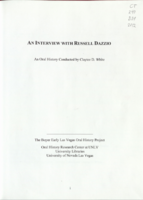Search the Special Collections and Archives Portal
Search Results
Polly F. Lilly oral history interview
Identifier
Abstract
Oral history interview with Polly F. Lilly conducted by Connie L. Patterson on March 26, 1976 for the Ralph Roske Oral History Project. In this interview, Lilly discusses a range of topics, from building a Catholic church in early Las Vegas, Nevada, to the nearby nuclear weapons tests. She also describes witnessing a confrontation between Senator Joseph McCarthy and Hank Greenspun on stage at the now demolished War Memorial Building in Las Vegas, Nevada.
Archival Collection
Celesta A. Lisle oral history interview
Identifier
Abstract
Oral history interview with Celesta A. Lisle conducted by Richard D. Juillerat on March 07, 1976 for the Ralph Roske Oral History Project on Early Las Vegas. Celesta Adelaide Lisle is accompanied by her daughter, Celesta Lisle, for the interview to help clarify information. Celesta Adalaide Lisle discusses moving to Las Vegas, Nevada in 1946 and describes her life as a housewife and motel operator. She also discusses her early life, her family, and personal travels.
Archival Collection
Marie Heher oral history interview
Identifier
Abstract
Oral history interview with Marie Heher conducted by her daughter Sharon Heher on March 01, 1977 for the Ralph Roske Oral History Project on Early Las Vegas. In the interview, Heher discusses her early life in Boulder City, Nevada and Henderson, Nevada, as well as her education in Reno, Nevada and Las Vegas, Nevada. Heher also discusses the Helldorado parades and her experiences with the Union Pacific Train Depot in downtown Las Vegas, Nevada.
Archival Collection
Gene Hotchkiss oral history interview
Identifier
Abstract
Oral history interview with Gene Hotchkiss conducted by Barbara Clark on June 27, 1975 for the Ralph Roske Oral History Project on Early Las Vegas. In this interview, Hotchkiss discusses her experiences living in Las Vegas, Nevada since 1946. Hotchkiss discusses the hotel industry, explaining that most casinos had a Western theme before the Flamingo was built, which started a luxury resort trend. Hotchkiss goes on to describe the development of Las Vegas Strip hotels.
Archival Collection
Alan Greenberg oral history interview
Identifier
Abstract
Oral history interview with Alan Greenberg conducted by David G. Schwartz on February 08, 2007 for the Remembering Jay Sarno Oral History Project. In this interview, Greenburg discusses his personal experiences with Jay Sarno. He describes attending school with Sarno at the University of Missouri and Sarno’s plan to open up casinos and hotels. Lastly, Greenburg talks about Sarno’s career in gaming, the opening of Caesars Palace in Las Vegas, Nevada, and recalls anecdotes of their friendship together.
Archival Collection

Transcript of interview with Russell Dazzio by Claytee D. White, November 4, 2013
Date
Archival Collection
Description
Text

Transcript of interview with Buddy Frank by David G. Schwartz, January 3, 2017
Date
Archival Collection
Description
Text
Fluff LeCoque oral history interviews
Identifier
Abstract
Oral history interviews with Fluff LeCoque conducted by Joyce Marshall on May 05, 1992 and May 21, 1992 for the UNLV University Libraries Oral History Collection. In these interviews, LeCoque discusses her early life in Montana and her career as a dancer. She talks about moving to Las Vegas, Nevada in 1947, singing at the Last Frontier Hotel with the Chuck Gould Orchestra, and traveling around the world in a dance troupe. LeCoque remembers performing at the Moulin Rouge in Los Angeles, California and working with Donn Arden. Later, LeCoque recalls dancing in
Archival Collection
Mike Meade oral history interview
Identifier
Abstract
Oral history interview with Mike Meade conducted by Steve Gortz on February 28, 1977 for the Ralph Roske Oral History Project on Early Las Vegas. Meade speaks about growing up in Tonopah, Nevada before its decline in population, his move to Elko, Nevada and eventually to the city of Las Vegas. Moreover, he talks about the development of the Strip, the differences between Las Vegas and rural Nevada, as well as the changing environmental landscape. Meade also spends time discussing the controversy surrounding the University of Nevada, Las Vegas (UNLV) dormitory at the time of this interview, the attitude of locals, and his opinion on brothels and prostitution. Lastly, Meade talks about the city’s pollution, the sports and recreation throughout the whole of the state and ends by reading a poem about Nevada from a Bicentennial book.
Archival Collection
Wilma Noyes oral history interview
Identifier
Abstract
Oral history interview with Wilma Noyes conducted by Claytee D. White on April 11, 2007 for the Boyer Early Las Vegas Oral History Project. In this interview, Noyes discusses her personal history and life in Las Vegas, Nevada from the 1920s onward. She describes moving to Las Vegas with her family in 1921 after her father got a job working for Union Pacific Railroad Company. Noyes explains how the railroad provided housing to its workers and what life was like in that housing. Noyes discusses attending the first schools in Las Vegas, one of them having had Maude Frazier as its principal. Noyes then describes what young people did for entertainment in Las Vegas, including dancing and going to movie theaters. Lastly, she discusses the history of the casinos and how the city has changed.
Archival Collection
